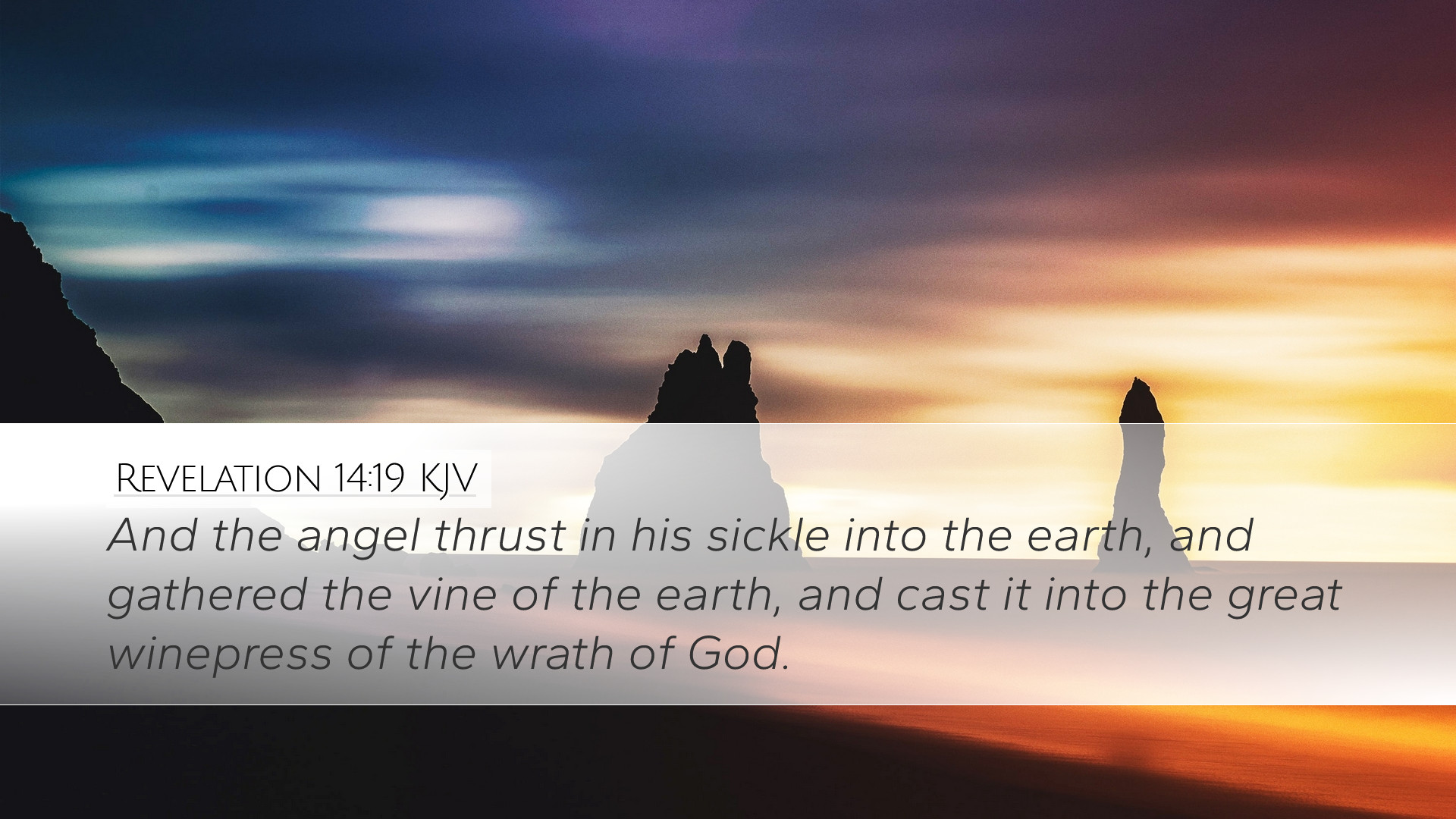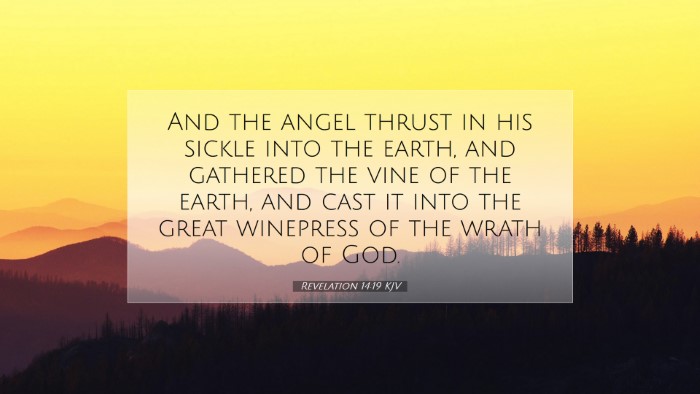Bible Commentary on Revelation 14:19
Text of Revelation 14:19: "And the angel thrust in his sickle into the earth, and gathered the vine of the earth, and cast it into the great winepress of the wrath of God."
Introduction
The passage in Revelation 14:19 presents a vivid and somber image of divine judgment. This commentary aims to draw insights from respected public domain commentaries to provide a meaningful exploration of the verse, essential for pastors, students, theologians, and Bible scholars.
Context of Revelation 14:19
This verse is situated within the broader context of Revelation 14, which is a chapter that speaks of the ultimate triumph of the Lamb and the impending judgment upon the earth. The mention of the angel with a sickle symbolizes God's authority in executing judgment and the final gathering of those destined for destruction.
Symbolism of the Angel and the Sickle
- Divine Authority: As noted by Adam Clarke, the angel’s action is a direct representation of God’s authority to harvest the earth, emphasizing that all judgment originates from divine will.
- Harvest Imagery: Matthew Henry elaborates on the sickle as a tool for harvesting, symbolizing the gathering of souls. The imagery of harvest reflects a time of reaping what has been sown, aligning with biblical principles of justice.
The Vine of the Earth
The "vine of the earth" is a distinct metaphor that represents those who have rejected God’s ways. Albert Barnes elaborates that the vine can be seen as a symbol of unfaithfulness and rebellion against God—a flourishing entity but ultimately destined for destruction.
Interpretations of "The Vine"
- Symbol of Corruption: The vine here can symbolize the corrupt practices of humanity, akin to Isaiah’s depiction of Israel as a fruitful vine (Isaiah 5). This contrasts true believers, emphasizing the need for holiness and separation.
- Gathering of Nations: The act of gathering the vine implies the consideration of nations as part of God’s divine plan. It signifies a collective judgment, hinting at the severity of God's wrath when nations oppose Him.
The Great Winepress of the Wrath of God
The "great winepress" metaphor is significant in biblical literature, often symbolizing the crushing judgment faced by the wicked. Matthew Henry indicates that the winepress serves as a metaphor for the great suffering and the overwhelming consequences of divine wrath upon the unrighteous.
Understanding the Winepress
- Judgment Imagery: Both Adam Clarke and Albert Barnes note that the use of a winepress illustrates how judgment can be severe and far-reaching, leading to the crushing of evil. It represents inevitable repercussions for sinful actions.
- Theological Significance: This imagery aligns with the theology of recompense, where works are judged accordingly. The idea of the winepress is not only to emphasize divine judgment but also to highlight the righteousness of God's actions in dealing with sin.
Theological Reflections
This verse is rich with theological implications concerning judgment, divine justice, and the ultimate fate of humanity based on their responses to God. It serves as a stark reminder of the seriousness of sin and the urgency of repentance.
Key Theological Concepts
- Divine Justice: The actions of the angel not only depict the reality of judgment but also emphasize God’s justice in His dealings with humanity.
- Call to Holiness: For believers, this passage serves as a call to maintain a life of holiness, ensuring alignment with God’s will and purpose, countering the temptation and corruption represented by the vine.
- Moral Accountability: The passage underscores that every action has consequences, affirming the idea that individuals and nations will be held accountable for their choices in accordance with divine standards.
Application for Pastors and Scholars
This commentary on Revelation 14:19 encourages pastors and scholars alike to approach this text with a heart of humility and a desire to seek God’s truth. It calls for thoughtful and prayerful engagement with the realities of divine judgment in preaching and teaching, fostering a robust biblical understanding that seeks to guide believers toward holiness.
Practical Insights
- Evangelism: The urgency of this text highlights the need for active evangelism, warning others of the consequences of unbelief.
- Discipleship: It informs discipleship practices, urging churches to anchor their teachings around themes of holiness and righteousness as vital in light of God’s impending judgment.
Conclusion
Revelation 14:19 stands as a powerful declaration of God’s sovereignty over judgment. It serves as a reminder of the seriousness of rebellion against God and the reckoning that follows. As discussed through various public domain commentaries, the themes of divine authority, the call for righteousness, and the ultimate consequence of sin urge a reflective response from every believer.


